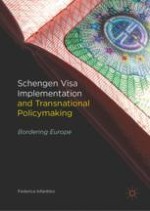2019 | OriginalPaper | Buchkapitel
Schengen Visa Policy-Making: Shifting Competence While Authorizing Discretion
verfasst von : Federica Infantino
Erschienen in: Schengen Visa Implementation and Transnational Policymaking
Aktivieren Sie unsere intelligente Suche, um passende Fachinhalte oder Patente zu finden.
Wählen Sie Textabschnitte aus um mit Künstlicher Intelligenz passenden Patente zu finden. powered by
Markieren Sie Textabschnitte, um KI-gestützt weitere passende Inhalte zu finden. powered by
